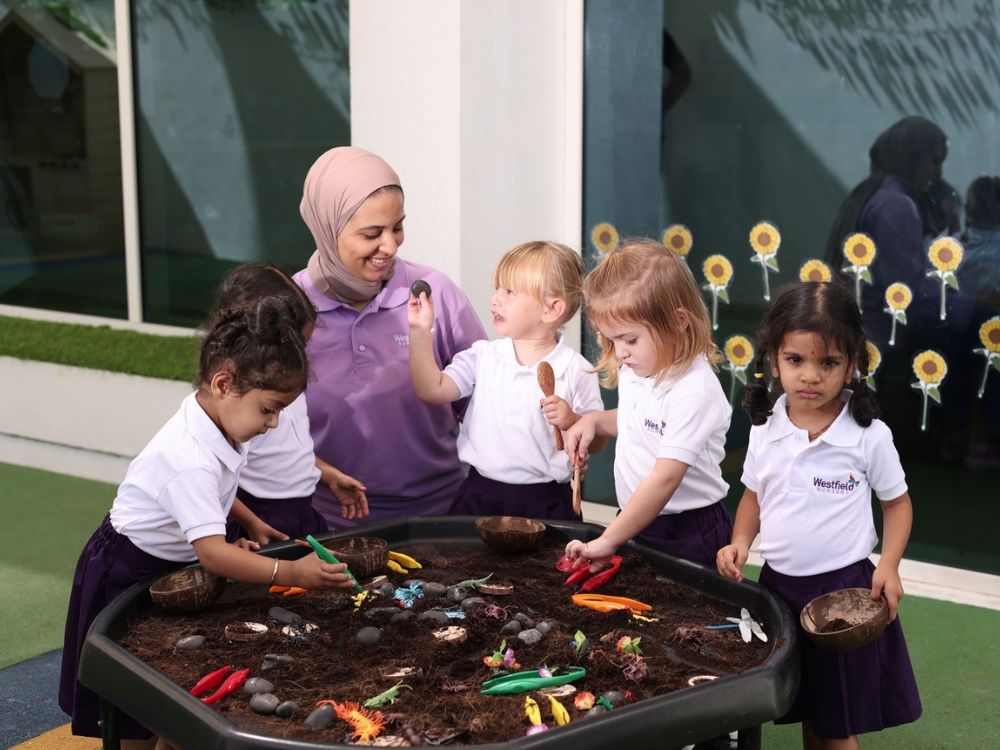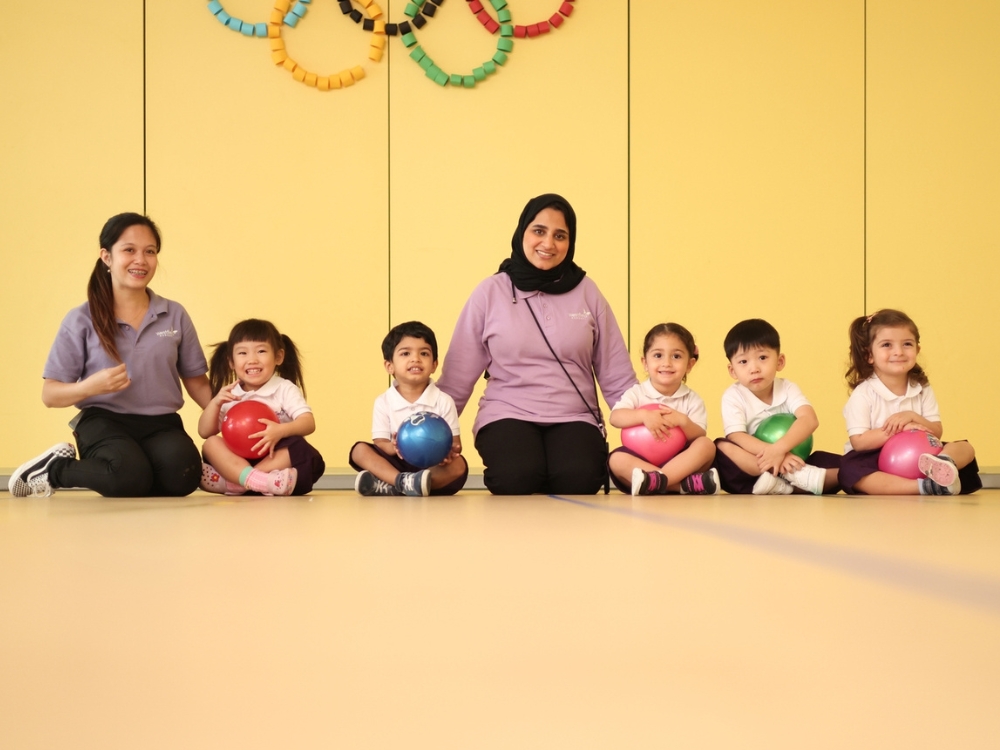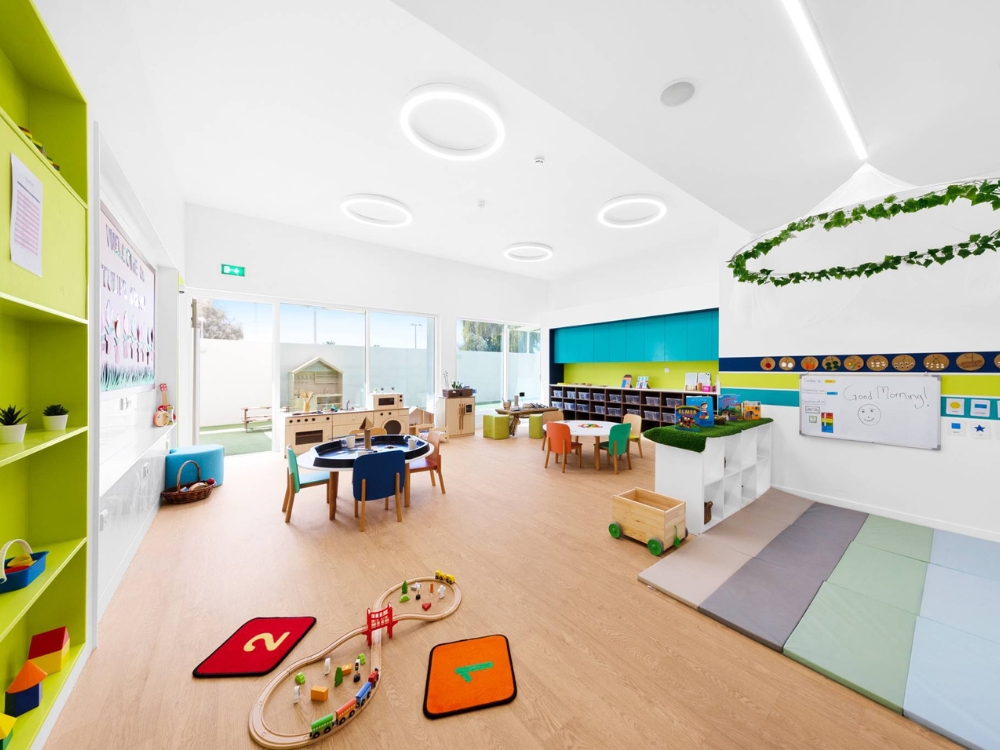 Discover the future of early learning with a glimpse into futuristic nurseries. From cutting-edge technologies to innovative teaching methods, explore how futuristic nursery learning and preschools are shaping tomorrow’s leaders. Uncover the latest trends in nursery learning that are revolutionizing early education and witness the evolution of traditional learning spaces into futuristic centers.
Discover the future of early learning with a glimpse into futuristic nurseries. From cutting-edge technologies to innovative teaching methods, explore how futuristic nursery learning and preschools are shaping tomorrow’s leaders. Uncover the latest trends in nursery learning that are revolutionizing early education and witness the evolution of traditional learning spaces into futuristic centers.
Unveil the secrets behind Dubai’s pioneering approach to early childhood education and delve into the realm of next-generation learning environments. Stay ahead of the curve by exploring these groundbreaking trends that are redefining nursery education for a new era with futuristic learning preschools.
1. Embracing Technology: Interactive Learning Apps | Latest Trends in Nursery
 Interactive learning apps in nursery settings engage young learners effectively, fostering creativity and critical thinking. These educational tools play a vital role in enhancing early literacy and numeracy skills among children. By introducing coding and programming concepts through interactive apps and early learning technologies, nurseries prepare children for the digital age seamlessly.
Interactive learning apps in nursery settings engage young learners effectively, fostering creativity and critical thinking. These educational tools play a vital role in enhancing early literacy and numeracy skills among children. By introducing coding and programming concepts through interactive apps and early learning technologies, nurseries prepare children for the digital age seamlessly.
Apps designed for nursery learning progress at a pace suitable for young minds, ensuring that each child can learn at their speed while being challenged appropriately by the technology-driven curriculum. The trend of incorporating interactive apps into early learning centers points towards a future where technology is an integral part of education from the very beginning.
Educational apps offer a diverse range of activities that cater to different learning styles, making it easier for educators to personalize teaching methods based on individual needs. Through these apps, children not only acquire knowledge but also develop essential skills such as problem-solving and collaboration – crucial abilities needed in today’s fast-paced world.
2. Outdoor Learning: Connecting with Nature | Latest Trends in Nursery
 Encourage sensory exploration by engaging children in outdoor activities, stimulating their senses and curiosity. By immersing young learners in nature at blue bird nurseries and other nurseries can instill a profound appreciation for the environment early on. Through outdoor play, children naturally enhance their gross motor skills as they run, jump, and climb.
Encourage sensory exploration by engaging children in outdoor activities, stimulating their senses and curiosity. By immersing young learners in nature at blue bird nurseries and other nurseries can instill a profound appreciation for the environment early on. Through outdoor play, children naturally enhance their gross motor skills as they run, jump, and climb.
Nature-based challenges not only allow kids to solve problems creatively but also teach them valuable teamwork skills. This approach fosters a sense of camaraderie among peers while honing critical thinking abilities. Hands-on learning experiences in natural settings offer unparalleled opportunities for practical application of theoretical knowledge.
3. Multilingual Education: Early Language Exposure | Latest Trends in Nursery
 Exposing children to multiple languages at a young age is crucial for enhancing language development. Through multilingual education, nurseries can cultivate cultural awareness and appreciation among children, fostering a more inclusive learning environment.
Exposing children to multiple languages at a young age is crucial for enhancing language development. Through multilingual education, nurseries can cultivate cultural awareness and appreciation among children, fostering a more inclusive learning environment.
Bilingualism supports brain development and cognitive skills in children, providing them with a solid foundation for future language learning and communication abilities. By introducing diverse languages early on, nurseries can nurture an environment that celebrates different cultures and backgrounds.
Multilingual education not only benefits language skills but also promotes social inclusion by embracing diversity within the nursery setting. Children exposed to multiple languages from a young age tend to have better problem-solving abilities and enhanced creativity due to their cognitive flexibility developed through bilingualism.
4. STEAM Approach: Integrating Arts into STEM | Latest Trends in Nursery
 The STEAM approach merges science, technology, engineering, arts, and math to provide a comprehensive educational experience for children. By incorporating artistic elements into traditional STEM subjects, students can enhance their creativity and innovative thinking skills.
The STEAM approach merges science, technology, engineering, arts, and math to provide a comprehensive educational experience for children. By incorporating artistic elements into traditional STEM subjects, students can enhance their creativity and innovative thinking skills.
This holistic learning method encourages hands-on projects that require problem-solving and critical-thinking abilities. Through art-infused activities, children develop a deeper understanding of complex concepts by applying them in creative ways.
Interdisciplinary connections between various subject areas are fostered under the STEAM framework. This integration helps children see the relationships between different fields of study, promoting a well-rounded approach to learning.
5. Mindfulness and Emotional Intelligence Training | Latest Trends in Nursery
 Teaching mindfulness techniques in nurseries helps enhance emotional well-being among young children. By incorporating emotional intelligence training, kids develop crucial skills like self-awareness, empathy, and social interaction abilities. These practices create a positive classroom atmosphere by encouraging strategies for emotional regulation.
Teaching mindfulness techniques in nurseries helps enhance emotional well-being among young children. By incorporating emotional intelligence training, kids develop crucial skills like self-awareness, empathy, and social interaction abilities. These practices create a positive classroom atmosphere by encouraging strategies for emotional regulation.
Furthermore, nurturing these skills equips children with valuable coping mechanisms that they can carry into adulthood to manage stress and anxiety effectively. Investing in mental health support at an early age fosters resilience and promotes overall well-being throughout their lives.
Emotional development is a key aspect of early childhood education as it lays the groundwork for healthy social interactions and mental health management in the future. By integrating mindfulness practices and emotional intelligence training into nursery learning environments, educators play a vital role in shaping children’s holistic development from a young age.
6. Personalized Learning: AI-Driven Customization | Latest Trends in Nursery
 Artificial intelligence plays a crucial role in tailoring learning experiences for each child, ensuring individual needs are met. By leveraging AI technology, nurseries can offer personalized feedback and adaptive learning pathways, enhancing engagement and motivation among young learners.
Artificial intelligence plays a crucial role in tailoring learning experiences for each child, ensuring individual needs are met. By leveraging AI technology, nurseries can offer personalized feedback and adaptive learning pathways, enhancing engagement and motivation among young learners.
Identifying strengths and areas for improvement through AI enables educators to optimize learning outcomes effectively. This customization fosters independent learning skills in children, allowing them to progress at their own pace while receiving tailored educational content that suits their unique requirements.
7. Virtual Reality Expeditions: Immersive Learning Experiences | Latest Trends in Nursery
 Virtual reality expeditions in nurseries, such as a futuristic nursery near city walk, offer children a unique opportunity to explore diverse locations and historical eras, fostering a deeper understanding of abstract concepts through immersive experiences. By engaging in virtual field trips and simulations, young learners can spark their curiosity and imagination, making learning more interactive and engaging.
Virtual reality expeditions in nurseries, such as a futuristic nursery near city walk, offer children a unique opportunity to explore diverse locations and historical eras, fostering a deeper understanding of abstract concepts through immersive experiences. By engaging in virtual field trips and simulations, young learners can spark their curiosity and imagination, making learning more interactive and engaging.
These VR expeditions provide a safe environment for hands-on exploration, allowing children to interact with the content actively. Through interactive VR technology, nurseries can create experiences that not only educate but also entertain, enhancing the overall learning process for early learners.
Moreover, virtual reality allows educators to tailor experiences to suit different learning styles and preferences. This customization ensures that each child can engage with the material in a way that resonates best with them individually. By incorporating VR technology and early learning technologies into nursery education, teachers can enhance student engagement levels significantly.
8. Sustainable Practices: Eco-Friendly Education | Latest Trends in Nursery
 Promoting environmental awareness and sustainability in early education is crucial. By teaching children about recycling, conservation, and waste reduction, nurseries play a vital role in shaping eco-conscious individuals from a young age.
Promoting environmental awareness and sustainability in early education is crucial. By teaching children about recycling, conservation, and waste reduction, nurseries play a vital role in shaping eco-conscious individuals from a young age.
Creating eco-friendly classrooms using sustainable materials not only reduces the carbon footprint but also sets an example for the children. Incorporating elements like recycled paper stationery or reusable containers can significantly impact their understanding of environmental responsibility.
Encouraging outdoor gardening and nature-based activities within nursery curriculums fosters a deep connection with nature. These experiences instill values of stewardship towards the environment while promoting physical activity and sensory exploration among children.
Instilling habits of responsible consumption early on can lead to lifelong practices that benefit the planet. By integrating lessons on energy-saving practices or water conservation into daily routines, nurseries contribute to building a generation that prioritizes sustainability in all aspects of life.
9. Parental Involvement: Home-School Collaboration Tools | Latest Trends in Nursery
 Effective communication between parents and educators is facilitated through digital platforms, enhancing parental involvement in their child’s learning journey. Regular updates and progress reports keep parents informed about their child’s development at school. Resources, tips, and strategies are shared to extend learning beyond the classroom.
Effective communication between parents and educators is facilitated through digital platforms, enhancing parental involvement in their child’s learning journey. Regular updates and progress reports keep parents informed about their child’s development at school. Resources, tips, and strategies are shared to extend learning beyond the classroom.
Collaboration with parents creates a supportive environment for learning both at home and school. By involving families in the educational process, a stronger partnership between parents and educators is forged to promote optimal child development.
Utilizing tools that enable seamless interaction between home and school environments benefits the child by creating consistency across different settings. This collaboration ensures that children receive consistent support from both teachers and parents throughout their early learning experiences.
Encouraging family engagement not only enriches the child’s education but also fosters a sense of community within the early learning center. When families are actively involved in their child’s education, it often leads to improved academic outcomes due to enhanced support systems both inside and outside of school.
10. Inclusivity and Diversity: Culturally Responsive Teaching | Latest Trends in Nursery
 Embrace diversity by integrating culturally relevant materials into the curriculum. This approach allows children to see themselves reflected in their learning environment, fostering a sense of belonging and identity.
Embrace diversity by integrating culturally relevant materials into the curriculum. This approach allows children to see themselves reflected in their learning environment, fostering a sense of belonging and identity.
Foster inclusivity by celebrating various cultures, languages, and traditions within the classroom. By exposing children to different perspectives, educators promote open-mindedness and cultural awareness from an early age.
Promote respect, empathy, and understanding among young learners through activities that highlight the value of differences. Encouraging discussions about diversity helps build a foundation for tolerance and acceptance in future interactions.
Create a safe space where all children feel valued and represented regardless of their background or beliefs. When students feel accepted for who they are, it enhances their self-esteem and encourages positive social interactions with peers.
Prepare children to thrive in a multicultural society by providing inclusive education that equips them with essential skills for navigating diverse environments confidently. Developing cultural competence early on sets the stage for a lifelong appreciation of global perspectives.
Final Remarks
The latest trends in nursery learning and futuristic early learning centers in Dubai showcase a shift towards innovative educational approaches. Embracing technology, promoting outdoor learning, and incorporating multilingual education are key aspects shaping the future of early childhood education. The integration of STEAM principles, mindfulness training, and personalized learning experiences further enrich the educational landscape for young learners. Virtual reality expeditions, sustainable practices, and fostering inclusivity and diversity highlight the holistic development focus in modern nurseries.
Exploring these trends not only enhances the quality of education but also nurtures a generation equipped with diverse skills and global perspectives. As the educational landscape continues to evolve, staying informed about these advancements is crucial for parents, educators, and policymakers to create nurturing environments that foster growth and learning for all children.
Frequently Asked Questions
What are the benefits and importance of using interactive learning apps in nursery education?
Interactive learning apps enhance engagement and cognitive development. They offer personalized learning experiences, promote critical thinking skills, and can adapt to individual student needs effectively.
How does outdoor learning contribute to children’s development in nurseries?
Outdoor learning fosters a connection with nature, promoting physical health, creativity, and problem-solving skills. It encourages sensory exploration and boosts emotional well-being through exposure to natural environments.
Why is multilingual education important for early language exposure in nurseries?
Multilingual education enhances cognitive abilities, cultural awareness, and communication skills. Early exposure to multiple languages supports brain development and lays a strong foundation for future academic success.
How does the STEAM approach benefit children’s learning in nurseries?
The STEAM approach integrates arts into STEM subjects (Science, Technology, Engineering, Mathematics), fostering creativity and innovation. It promotes interdisciplinary thinking, and problem-solving skills, and prepares children for future careers in diverse fields.
What role does parental involvement play in enhancing nursery education through home-school collaboration tools?
Parental involvement strengthens the educational journey by fostering communication between parents and educators. Home-school collaboration tools facilitate sharing progress updates, and discussing challenges or achievements promptly to ensure holistic child development.
Imagine your child’s eyes lighting up as they climb towering castles, craft magical stories, and discover endless joy at our sun-drenched nurseries. See the EYFS curriculum come alive firsthand! Book your tour today and unlock their boundless potential: https://www.atticuseducation.ae/nurseries/
[ratemypost]





